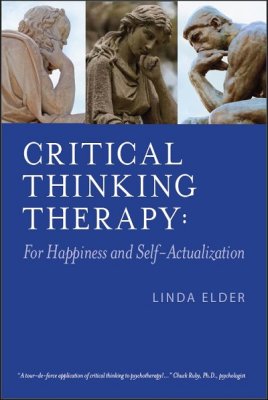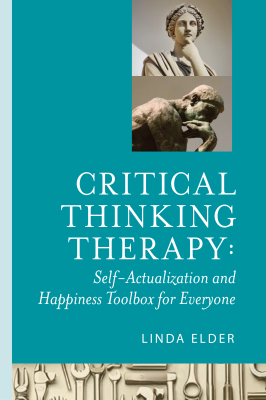Professional Development in Critical Thinking Therapy
For Mental Health, Self-Actualization, Creative Potential, and Intellectual and Ethical Character Cultivation
|
|
 In our largely pathological world, mental suffering is common. It is increasingly a worldwide epidemic. People often turn in the wrong directions for relief from their emotional suffering.
In our largely pathological world, mental suffering is common. It is increasingly a worldwide epidemic. People often turn in the wrong directions for relief from their emotional suffering.
A great number of books and resources are now available for those who struggle to find happiness or contentment in the world we humans have crafted. Throughout the past half century or more, a tremendous mass of literature has been developed to help humans become satisfied and fulfilled. The problems of depression, anxiety, and related emotional states are increasingly in focus through this literature. And yet, with all our knowledge and wisdom, with all our books and guides and videos, and with all the scientific promises, humans are still doing a relatively poor job of alleviating the suffering caused by depression, anxiety, and similar tormenting states of mind. Similarly, we have yet to effectively deal with the irritability, defensiveness, irrational anger, and self-justifying behavior that, though they may not lead directly to depression or anxiety, keep people from relating intimately with others and developing their innate capacities. And even those who do not experience pervasive negative emotions will yet rarely achieve self-realization or self-actualization, which is the most fulfilling level of thinking and living; this requires achieving the skills and abilities, and embodying the virtues, of the fairminded critical thinker. And it is self-actualized people, unfettered by nagging negative emotions, who can potentially make the greatest contributions to improving human life, as well as our treatment of the earth and its other sentient creatures.
 Therapists need all of the important concepts and principles in critical thinking if they are to have the greatest chance of assisting clients in finding a reasonable path to contentment and happiness in our complex world. The more deeply that therapists internalize critical thinking concepts and principles, the more tools they have for reaching the uniquenesses of each client. Yet, to this point, explicit critical thinking, with emphasis on both the barriers to criticality and a holistic framework for improving thinking, has been chiefly missing from the therapeutic setting. For this reason, and with the introduction of this therapeutic process, we now offer training and certification for therapists in Critical Thinking Therapy.
Therapists need all of the important concepts and principles in critical thinking if they are to have the greatest chance of assisting clients in finding a reasonable path to contentment and happiness in our complex world. The more deeply that therapists internalize critical thinking concepts and principles, the more tools they have for reaching the uniquenesses of each client. Yet, to this point, explicit critical thinking, with emphasis on both the barriers to criticality and a holistic framework for improving thinking, has been chiefly missing from the therapeutic setting. For this reason, and with the introduction of this therapeutic process, we now offer training and certification for therapists in Critical Thinking Therapy.
 Critical Thinking Therapy, which includes Critical Thinking Self-Therapy, assumes that being in healthy command of your life in our complicated, frequently dark world requires systematically employing critical thinking throughout your life. This form of therapy therefore teaches the explicit concepts and principles of critical reasoning to help therapists and clients, as well as people working alone, explicitly guide their mental and emotional lives onto higher, more fulfilling, more self-actualizing ground.
Critical Thinking Therapy, which includes Critical Thinking Self-Therapy, assumes that being in healthy command of your life in our complicated, frequently dark world requires systematically employing critical thinking throughout your life. This form of therapy therefore teaches the explicit concepts and principles of critical reasoning to help therapists and clients, as well as people working alone, explicitly guide their mental and emotional lives onto higher, more fulfilling, more self-actualizing ground.
Critical Thinking Therapy provides therapists with a holistic approach to therapy using the broad range of critical thinking tools. An ultimate goal in Critical Thinking Therapy is the development of ethical character as we reach toward self-actualization. It is not a vague approach that simply looks for thinking underlying behavior. Rather, it is a way of living in which we reach for the highest levels of thought and action across all parts of our lives, and in which we believe in the power of our own minds.
Critical Thinking Therapy advances a broad range of skills of deep internal reflection that enable people to better answer questions such as these:
 How can I get outside my merry-go-round thinking (like worrying) and create new options for myself?
How can I get outside my merry-go-round thinking (like worrying) and create new options for myself?Critical Thinking Therapy will most likely appeal to therapists already using a cognitive behavioral therapy approach, since Critical Thinking Therapy’s main emphasis is on uncovering faulty thinking that leads to problematic expectations or behavior. But there are better and worse approaches to cognitive behavioral therapy, and ultimately, critical thinking is required to accurately critique all forms of therapy – including cognitive behavioral therapies.
 At present, while there are therapists who think critically in significant ways, there are no Critical Thinking Therapists per se – that is, no therapists yet trained in a full, explicit framework of critical thinking.
At present, while there are therapists who think critically in significant ways, there are no Critical Thinking Therapists per se – that is, no therapists yet trained in a full, explicit framework of critical thinking.
Below are Critical Thinking Therapy resources and training opportunities offered by the Foundation for Critical Thinking.
 Read the concise edition of Critical Thinking Therapy, titled, Critical Thinking Therapy: Self-Actualization and Happiness Toolbox for Everyone.
Read the concise edition of Critical Thinking Therapy, titled, Critical Thinking Therapy: Self-Actualization and Happiness Toolbox for Everyone.